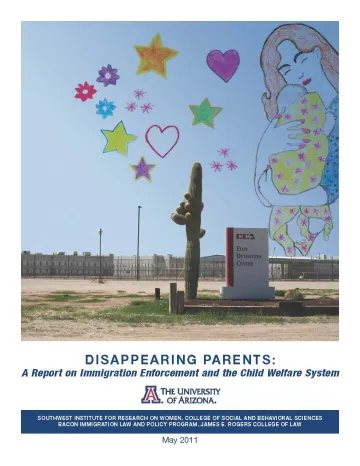
In May 2011, the Bacon Immigration Law and Policy Program, in partnership with the Southwest Institute for Research on Women, published "Disappearing Parents: A Report on Immigration Enforcement and the Child Welfare System" (PDF) The report describes families entangled in two vast bureaucracies: the federal immigration enforcement system and the state child welfare system.
The failure of these two systems to work together results in abrupt separations of parents and children after a parent is swept up in immigration enforcement and, at times, long-term stays in foster care for youth whose parents are detained or deported.
"Disappearing Parents" is based on over a year of research, including over fifty surveys and twenty interviews with juvenile court judges, attorneys representing children and parents in juvenile court, and case workers in Child Protective Services.
In the report, attorneys, judges, and caseworkers in the child welfare system describe widespread confusion about how to contact parents once they are picked up by immigration enforcement. Many describe cases in which a parent suddenly disappeared after an encounter with immigration, and as a result, their children have spent long periods of time in the foster care system. Others report cases in which domestic violence victims were unreachable in detention centers, and as a result, their abusive spouse took custody of the children.
Key Findings
- Disappearing Parents: attorneys, judges, and caseworkers all consistently described the difficulty of locating parents apprehended by immigration enforcement.
- Better Off in Jail: many personnel in the child welfare system commented that incarcerated parents are actually better off in some state jails and prisons than in immigration detention facilities. Unlike immigrant detainees, they are relatively easy to reach, can be transported to hearings, and have access to programming so they can work towards reunification while incarcerated.
- Prolonged Detention: Contrary to its public statements regarding prioritizing detention resources for serious criminal aliens, ICE often holds parents with children in state custody in detention for long periods, even when the parents have no serious criminal history and have strong incentives not to abscond.
- The Climate of Fear: child welfare personnel described stories of immigrant children too fearful of the government to come to family court for their custody hearings, an undocumented father so fearful of traveling by bus that he was unable to reunify with his infant daughter, and a young teenager running away from the child welfare system altogether to be with her deported mother.
The report contains detailed recommendations for the Department of Homeland Security, state child welfare systems, and Congress. Recommendations range from providing enhanced legal assistance to immigrant parents with U.S. citizen children in state custody to appointing key liaison positions in ICE and the child welfare system to improve the ability of the two systems to communicate and coordinate with one another.
Additional Resources
